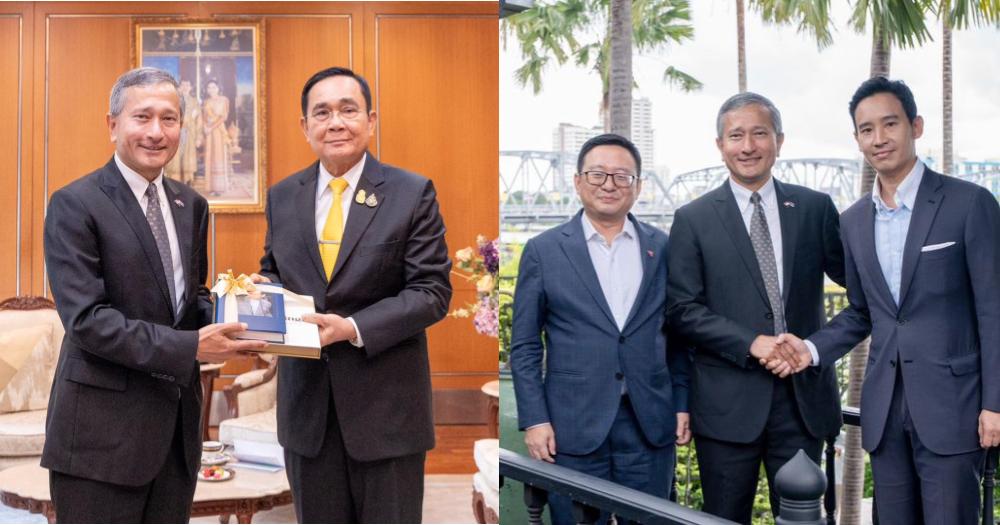Singapore's Minister for Foreign Affairs Vivian Balakrishnan spoke to the press at the end of his two-day visit to Thailand, where he emphasised Singapore’s long and strong relationship with the kingdom.
Vivian, together with Thailand’s foreign minister Maris Sangiampongsa , officiated the opening ceremony of the 14th Thailand-Singapore Civil Service Exchange Programme (CSEP), aimed at enhancing cooperation between the two civil services in areas such as health, education, and trade facilitation.
The previous iteration of CSEP was in 2017.
Vivian also met with various political leaders in Thailand, including members of the government such as privy council members Surayud Chulanont and Prayut Chan-o-cha, and the leader of the Thai parliament’s largest party, the Move Forward Party.
Close relationship
Vivian lauded the close relationship between Thailand and Singapore, marking 60 years of diplomatic relations.
Vivian noted that Singapore’s age and its bilateral relationship with Thailand was the same, because Thailand was one of the first countries to recognise Singapore’s independence.
He also expressed his gratitude to Thailand for the assistance they had lent the passengers and crew of SQ 321.
The aircraft had experienced severe turbulence, leading to one death and several injuries.
The plane had made an emergency landing in Bangkok with Thai medical staff meeting the plane on the tarmac.
Old world order
Bilateral trade between the two countries now stands at S$41 billion a year and is expected to grow further, and Singapore was Thailand's second largest foreign investor in 2023.
"We have real stakes in the Thai economy, and we believe in its potential. We want Thailand to succeed," Vivian said.
Vivian said it is important for countries like Thailand and Singapore, especially at times of such high global volatility, to double down on engagement and economic integration, as well as to continue to search for new opportunities in the emerging economy.
He said that at the end of his trip, his sense from the discussions he had held with those from across Thailand’s political spectrum, was that there is a need to emphasise economic growth.
Changing global environments
Mothership asked if in the seven years since the last CSEP, whether the changing global environment had led to a change in focus for its participants.
Vivian encouraged taking a long term perspective. In the 70 year post-war period, both Singapore and Thailand have made enormous economic strides.
These were enabled by the multilateral rules-based liberal economic order which encouraged investments, global supply chains, and the free flow of capital.
Vivian said that Thailand and Singapore both benefited from that rules-based order, which he referred to as the Pax-Americana.
But both countries had also benefited from the reform and opening of China and India, as well as the expansion of Asean after the end of the Cold War.
In all these cases, the relatively advanced economies of Thailand and Singapore were able to take full advantage of such a world.
But the pillars of that world that prevailed for the last five decades are now under pressure both domestically and globally.
New and innovative ways of doing business
This means that Singapore and Thailand could no longer afford to “simply keep doing more of the same” and would need to find new and innovative ways of doing business.
Vivian said that within Asean, it would be necessary to double down on Asean integration and connectivity.
Asean needs to increase infrastructure investment, which would enhance its competitiveness.
There is a need to enhance intra-Asean trade, Asean's ability to produce more food, more renewable energy, and make those offerings competitive on a global stage.
The more unsettled world and the old formulas for peace and prosperity are under pressure, and there is a need to double down within Asean and double down bilaterally.
“You need to look for innovative win-win solutions, and to take a long-term, constructive, mutually beneficial approach for this.
I am confident we can find it.”
BRICS by brick
When asked about Thailand and Malaysia exploring the possibility of joining BRICS, Vivian stressed that the fundamental organising unit for Southeast Asia remains Asean.
There is no substitute for Asean as a single production zone or organising unit, with a population of 680 million people and a GDP of US$3.5 (S$4.7) trillion.
But there is no need for any country to restrict itself to Asean alone, saying that Asean had itself formed the Regional Comprehensive Economic Partnership which involved five other non-Asean countries.
Singapore and Vietnam are part of the Comprehensive and Progressive Agreement for Trans-Pacific Partnership; and Thailand and Indonesia expressed interest in joining the Organisation for Economic and Cooperation and Development, the OECD.
Thailand exploring the opportunities involved with joining BRICS is useful in its own right.
"It is not either or. It is additive," Vivian said.
Vivian also said that attempts to broaden markets and reach a wider architecture are not “inimical” to Asean’s overall growth or to bilateral relations.
With the world economic paradigm under pressure, nations need both bilateral and multilateral arrangements.
“[As long as] all these measures lead to greater openness, inclusiveness and, a level playing field, make Asean member states more attractive for investments and promote trade, we are in support of all these exploratory moves.”
Top image via Vivian Balakrishnan/Facebook

If you like what you read, follow us on Facebook, Instagram, Twitter and Telegram to get the latest updates.



